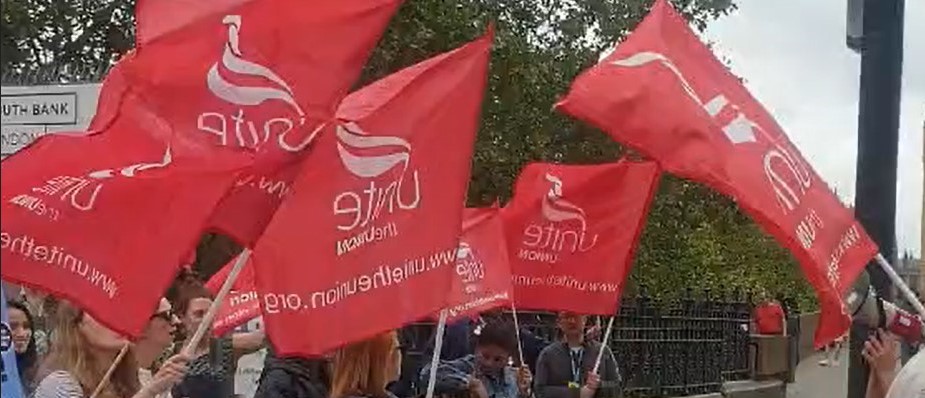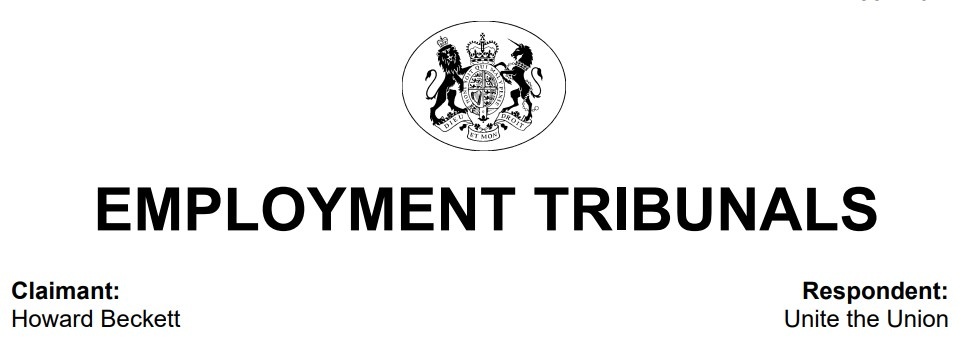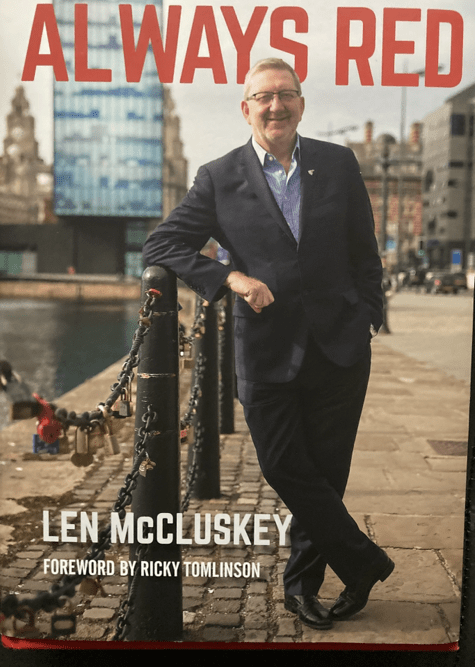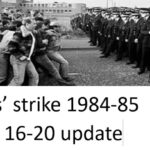 Unite and ‘that’ hotel: what is going on?
Unite and ‘that’ hotel: what is going on?By Left Horizons supporters in Unite
Members of the union Unite will have been rocked by the latest revelations that came out of an Employment Tribunal for a former senior official. The revelations concern the hotel and conference centre that the union had commissioned to be built in Birmingham.
Among the many startling revelations from the Employment Tribunal (ET), one stood out a mile: the hotel and conference centre was originally budgeted to cost £7mn, and ended up costing £100mn, and is now independently valued at just £29mn. That is a lot of money, for which Unite members need explanations.
The ET was looking at claims of the union’s former Assistant General Secretary, Howard Beckett, who resigned the day before a scheduled disciplinary hearing, and it found his claims to have been completely without merit. His main argument was that as both an employee and a member of Unite, the union should fund his legal action against itself for subjecting him to disciplinary action over his handling of the hotel project! In another part of Beckett’s case, he argued that as a senior employee of Unite, he should not have to provide sick notes for his absence due to stress.
This is one of the contradictions of Unite: many officers, particularly the ambitious ones, are members of Unite, which of course creates a conflict of interest as they are both members and employees of the union. The office staff, and those officers who seem to just want to do a job, are members of GMB.
The story of the hotel began back in 2011, when Len McCluskey won the election to be the Unite General Secretary. At that time, Unite had two residential colleges, one in Eastbourne, Sussex, and another in Esher, Surrey. Neither is suitably placed for a union with so many members in Merseyside, Lancashire, Yorkshire, Scotland and the Midlands.
Series of bureaucratic mergers
This legacy was due to the series of bureaucratic mergers that built Unite into a large multi-sector union. Each time the union leaders wanted a merger, they told members that the new, larger, union would have multiple colleges, lots of offices and plenty of professional staff.
Then once the members had voted for a merger, the colleges were sold, offices closed, and staff given redundancy. Each of the unions that have formed Unite – TASS, ASTMS, MSF, AEU, EETPU, GPMU, UCATT and TGWU – had their own colleges, of various sizes, and in diverse locations. But somehow we ended up with the Eastbourne hotel (TGWU) and the Esher college (EETPU) – and neither is at all easy to get to from the North, Scotland or Wales.
So when McCluskey revealed a plan to sell Esher, which is a Grade 2 listed building (more like a stately home than a union office), and to build a new modern venue in a central location for around £10 million, there was a lot of enthusiasm across the union.
Planning permission for a hotel and conference centre was given in 2015, and the documents at that time gave an estimated cost of £35 million. Everyone accepted that the build might cost a bit more than a normal commercial build, because Unite’s construction members insisted that the union debar building firms who had been involved in blacklisting building workers. Also, a Unite conference motion mandated that the contractors, quite rightly, should recognise trade unions.
A close friend and confidante of McCluskey
But in 2019, Ed Sabisky, Unite’s Finance Director is reported to have told McCluskey that it was going to cost more like £112 million. Sadly, Sabisky died suddenly in 2020.
Howard Beckett was at that time an Assistant General Secretary of Unite and he was appointed to head the hotel project in place of Sabisky. Beckett at that time was a close friend and confidante of McCluskey, having been given a job heading up the Unite legal department after he sold his law firm to Thompsons for a reported £1 million.
Subsequently, McCluskey sent Beckett into the West Midlands region to deal with the right wing influence there, which had been built up by failed general secretary candidate, Gerard Coyne. In his book, Always Red, Len McCluskey refers to Beckett as “absolutely brilliant”, “a legal genius” and “a committed socialist”.
Meanwhile, the hotel had been built by The Flanagan Group (TFG) whose boss, Paul Flanagan, had also managed to become a friend of McCluskey’s. Paul Flanagan himself was arrested (and later released without charge) as part of Operation Aloft, a totally separate inquiry into property deals involving Liverpool City Council.
In 2021, Sharon Graham was elected as the new General Secretary of Unite. When she came to sign off the union’s accounts she noticed the hotel sitting there with a cost of £112mn. She asked for the valuation of the hotel – and there wasn’t one. Alarm bells started to ring.
When she commissioned an independent valuation, it came out to just £29mn! It was a shock. How could the union have spent £112mn on a building worth barely a quarter of that?
Baffled by mention of missing money
Next she commissioned a barrister to investigate the costs and accounting for the project. He found that a sum of £14mn was missing from the final accounts, “…and it remains a mystery as to how and why this figure had been assessed – and presumably paid to Flanagans”. (Quoted in the Employment Tribunal, Beckett vs Unite here)
The Flanagan Group themselves say they are baffled by mention of a missing £14mn, and point to the fortnightly cost predictions they supplied to Unite.
According to the i newspaper, “He (McCluskey) explained that the cost increase was primarily down to implementing a union protocol, requiring that only directly-employed workers on national pay rates and with union membership work on the site”.
But at a recent Unite meeting on Merseyside, members of the Construction section reported that a worker on a Flanagans site, who believed he was a member, found that the union had no record of his membership when he needed help with a problem at work. If that were true, it would appear, then, that the union may have had an agreement with Flanagans, whereby the firm paid subs for a proportion of the workforce, but workers weren’t actually individual members. This was a practice in construction under the old Amicus/EETPU regime.
There are other strange facts to be explained. In March 2022, the managing director of the firm looking after health and safety on the hotel project pleaded guilty to the supply of drugs, including heroin, and got fourteen years jail time. The firm he worked for, Safety Support Consultants, is also involved in the inquiries into property deals in Liverpool, and employs the son of the former Liverpool mayor, Joe Anderson.

A further interesting question is how the hotel was paid for. Unite paid a quarter of the costs itself, but the other three-quarters was paid by Blackhorse, a special purpose company wholly owned by Unite. The reason for this peculiar arrangement is not clear to Unite members. On checking who were the directors of Blackhorse, they all turn out to be either long-standing members of the United Left grouping on the union National Executive, or senior officials of the union.
McCluskey himself was a director from 2016 to September 2021 when he was replaced by Sharon Graham. Assistant General Secretary, Gail Cartmail, was a director for 7 months in 2023, after which she was replaced by Sharon Graham’s chief of staff, Sarah Carpenter. The Employment Tribunal heard that the lay member’ directors of Blackhorse, “Monica Sorice, Simeon Jones and Tom Murphy had asked the Claimant [Beckett] for a valuation but to no avail.” (Quoted in Beckett vs. Unite)
Then, in April 2022, the police and HMRC raided the Unite headquarters and also Howard Beckett’s home, in an investigation into bribery, fraud and money laundering, and as a result, Unite suspended him.
In August 2022, Sharon Graham’s chief of staff told Beckett that he was going to be put through disciplinary action for what the union said was a misleading report on the hotel which had been presented to the union’s Executive Council. He went off sick almost straight after.
When, eventually, the union decided it could wait no longer and moved to hold a disciplinary hearing in his absence in January 2023, he resigned the day before the hearing. This prevented the union making a finding of fact on his responsibility for the report, which had asserted that whatever the hotel had cost was also its value; plainly a nonsensical and circular argument.
Beckett then launched legal action at the Employment Tribunal – for constructive dismissal, as Unite had refused funding for his legal action against Unite itself, for being subjected to unreasonable discipline after standing for election as General Secretary, for failing to care for him during a long period of sickness, for breaching his right to privacy with alleged leaks to the press, and for inventing baseless disciplinary charges over the report to the Executive on the hotel and its costs.
A detailed report on hotel project presented to EC
He failed on all counts, the Employment Tribunal report stating: “The unanimous judgment of the Tribunal is that the claims pursuant to sections 64 and 146 of TULCRA fail and are dismissed. The claim for constructive unfair dismissal fails and is dismissed.”
The Employment Tribunal looked at the Special EC meeting of January 2022 where Beckett explained his view of the hotel and its costs. It is worth quoting the ET’s assessment of the report (which is in the public domain) at length:
“At this meeting the Claimant [Howard Beckett] presented a detailed report on the Birmingham Project. The Claimant advised the [Executive] Council that the Birmingham project has been valued at the cost of construction making it a sound investment for the Union. The Claimant had responsibility for the financial issues of the Birmingham Project on being appointed as Interim Finance Director following the unexpected death of the Ed Sabisky, Executive Director, Finance, Property and Pensions (Mr Sabisky) on 1 March 2020.
“It was surprising that he [Beckett] remained in post as Interim Finance Director for such a long time, as he does not have accounting experience. Mr McCluskey’s evidence was that the tragic nature of Mr Sabisky’s death, who was a close personal friend, meant that he was unable to focus at that time on a permanent appointment particularly given that a General Secretary election was impending.
“The Claimant gave a series of reasons why additional costs had been incurred, to include an extra floor having been added, additional sprinklers, post the Grenfell fire, an increase from 3 to 4 star rating, building inflation costs being particularly high in Birmingham and the Unite protocol (which involves contractor firms paying above the minimum wage at circa £11.50 per hour)”. (Beckett vs. Unite, emphasis added)
Howard Beckett’s defence to the allegation of presenting a misleading report to the Executive is also summarised in the Employment Tribunal:
“At paragraph 10, he advised that the presentation given to the Special Executive Council meeting had not been prepared by him and had been put together by Purple Apple for Mr McCluskey and Mr Murray who agreed it should be reported to the EC. At paragraph 44 he said that the previous General Secretary was aware of everything”
Len McCluskey appeared as a witness for Beckett
The Acting Finance Director of Unite, Gush Uppal, when interviewed as part of the Unite internal inquiry stated that, “…the presentation given by the Claimant to the Special Executive Council was selective and constructed in such a way to convey that there was no issue. Whilst there was nothing incorrect there were a lot of half-truths.” (Quoted in Beckett vs Unite)
At the Tribunal, McCluskey, who appeared as a witness for Howard Beckett, said that the allegation that the Claimant had misled the Executive Council was “wrong and unfair”. The union chose not to interview McCluskey as part of its internal inquiry into the Birmingham hotel, despite him requesting this, and he eventually submitted a 4-page memorandum which was considered by the Employment Tribunal. The Tribunal noted, “We find it extremely surprising that [Unite] deemed it unnecessary or inappropriate to interview Mr McCluskey.” (Beckett vs. Unite)
So really, for any union members interested in what goes on at the top of their union – which they pay for, with their subs – the Employment Tribunal has raised more questions than answers.
The police inquiry grinds on, with no guarantee of ever proceeding to a court case. Operation Sheridan launched in Lancashire and Liverpool in 2013 saw prominent businessmen and council officials arrested, amidst swirling rumours, but 11 years later, no-one has been prosecuted. Four men are to go trial – in 2025!

The ex-MP for Liverpool Walton, Peter Kilfoyle, made a prediction in his blog of something similar – that there would be no prosecutions – for Operation Aloft, another series of arrests connected to land deals in Liverpool. Why the CPS appears reluctant to take action in these cases is a bit of a mystery. People might think it is because court cases would be too embarrassing to the political establishment. Or, in the words of Karl Marx, is it impossible to tell where swindling ends and business begins? Or maybe the evidence is just not strong enough.
Health visitors conferencee held in a Holiday Inn
But Unite is now left with a hotel that cost £112 mn but is only worth £29 mn. And what’s worse is that the hotel charges Unite high fees to hold union events there, so we are still going to Eastbourne, a 5-hour journey from the north, for training courses.
The recent Unite health visitors conference had to be held in the Birmingham Holiday Inn – when we own a hotel and conference centre a few hundred yards away. How does that work?
At the November Unite Services Sector conference (in Brighton…) Sharon Graham promised that the union would go after the money. She talked of “fourteen years of corruption”, which has “run to millions of pounds” and having to “cut out the leeches”. We will see. The idea of the union itself pursuing the money seems to implicitly accept that the police inquiry may end up buried in the CPS.
In the meantime, she cannot sign off the union accounts due to the missing £14 mn, nor proceed with a full investigation due to instructions from the police not to prejudice their inquiries. In a further sinister twist, Sharon Graham was apparently threatened in the street by four men, who told her not to go looking into the hotel.
‘Mess’ does not even begin to describe it.
The root cause, as Sharon Graham said at the Service Sector Conference, was that the EC members were more accountable to the faction to which they owed their positions than to their actual constituencies who elected them, either regional or industrial. Anyone who asked too many questions was faced being “removed from the slate” while others who played the game were rewarded with “grace and favour” – in Sharon Graham’s words.
But why were the EC members more accountable to this faction than to their members? The answer is to be found in the Unite rulebook, which intentionally weakens the link between lay office holders and the people who put them there.
In the case of the EC members, they are elected by a postal vote only once every three years. They never meet their electors in a formal setting, and many of them do not give written report backs to their industrial or regional constituencies, so the members are in the dark about what goes on in EC meetings.
Ordinary members and reps excluded from higher union structures
In the case of the RISCs (Regional Industrial Sector Committees), they too are elected every three years, by a one-off gathering of reps in their sector. Then they never meet them again until the next triennial regional industrial conference.
This is actually quite deliberate. The Unite rulebook is largely the old Amicus rulebook with some TGWU add-ons. Amicus was supposed to be a huge, Blairite monolith in the trade union movement, permanently controlled by right-wing officials. That all fell apart, as it was bound to do eventually, with the election of Derek Simpson in 2002. But the intention was there and, with a few modifications, their rules are still enshrined in our rulebook.
Even in the EETPU, the bureaucracy could never quite snuff out the left, because of the left strongholds in the branches. They tried and they tried, but in the end the only measure they could take was to reduce the branches to near-irrelevance. This they did on merger with the engineering union, the AUEW, to become the AEEU in 1992, and on the further merger with MSF to form Amicus.
The branches in Amicus could not send delegates to conference or to Regional Committees. They could not give solidarity donations to industrial disputes outside Amicus and their funding was restricted to a derisory 4% of members’ subs.
Blocking members and activists reflected in election turnouts
To take part in the union structure you had to be a rep or a branch officer, thereby cutting out the 99% of members who are not reps. It was a lot easier for the bureaucracy to control and police 10,000 reps than 1 million members. This rule also meant that if the Amicus bureaucracy withdrew credentials from a rep, or if they colluded with an employer to get someone sacked, they were out of the union structure as well. Very convenient! For the leaders of Amicus at least.
But blocking so many members and reps from involvement in the union had its price in a lack of engagement and involvement. The EETPU was forced to merge because ultimately you cannot run a union with paid officials alone. Any union depends on an army of volunteers; its reps, who do the lion’s share of recruiting and representing members. No reps means no recruitment, no service – and no union.
Some of this is what has led to the long-running scandal of union officers’ collusion in blacklisting in the Construction sector, and the failure of Unite to look into it properly – until very recently. It has to be said that the disgusting collusion in blacklisting was very much an EETPU, and later AEEU, practice. No TGWU officer has ever been implicated in blacklisting.
Sharon Graham has set up the first truly independent inquiry into union involvement in blacklisting, and its report is due imminently. Its findings are fairly predictable: it will probably find that some EETPU and later AEU officials did give information to the blacklisters, and that many good workers and trade unionists had their lives blighted as a result, but that these officials retired long ago (on good union pensions) or took payouts to leave. It is a sad and troubling story.
But the task for socialists and honest trade unionists now is to fix the system that made all this possible. The only protection against bureaucratism, cover ups and factional domination is participation and democracy. We must strengthen the role and the voice of ordinary members, the reps and the branches in Unite, widen participation and end the rule of top-down undemocratic factions in our union.
Democratise Unite!
 How the Labour leaders were ‘love-bombed’ by lobbyists - By John Pickard The new Labour government, like any Labour government, has a choice. It can challenge the vested interests of capitalism, the big banks,
How the Labour leaders were ‘love-bombed’ by lobbyists - By John Pickard The new Labour government, like any Labour government, has a choice. It can challenge the vested interests of capitalism, the big banks, Miners’ Strike 1984-5 – Weeks 16-20 Update - Throughout this 40th anniversary year of the miners’ strike, Left Horizons will publish regular bulletins on important issues and developments that occurred during the strike,
Miners’ Strike 1984-5 – Weeks 16-20 Update - Throughout this 40th anniversary year of the miners’ strike, Left Horizons will publish regular bulletins on important issues and developments that occurred during the strike, Why the private sector is no solution to the NHS crisis - From ‘Just treatment’ website The new Labour government has inherited a broken National Health Service, after 14 years of Conservative cuts, underfunding and outsourcing. There
Why the private sector is no solution to the NHS crisis - From ‘Just treatment’ website The new Labour government has inherited a broken National Health Service, after 14 years of Conservative cuts, underfunding and outsourcing. There Care Quality Commission is not fit for purpose - By Andy Ford, Unite Health EC member The new Health Secretary, Wes Streeting, has rightly castigated the Care Quality Commission (CQC) for, amongst many things,
Care Quality Commission is not fit for purpose - By Andy Ford, Unite Health EC member The new Health Secretary, Wes Streeting, has rightly castigated the Care Quality Commission (CQC) for, amongst many things, What fascism meant then…and now - By Mark Langabeer, Hastings and Rye Labour Member During the 1930s, Leon Trotsky wrote about the rise of fascism in Germany and other European countries.
What fascism meant then…and now - By Mark Langabeer, Hastings and Rye Labour Member During the 1930s, Leon Trotsky wrote about the rise of fascism in Germany and other European countries.

